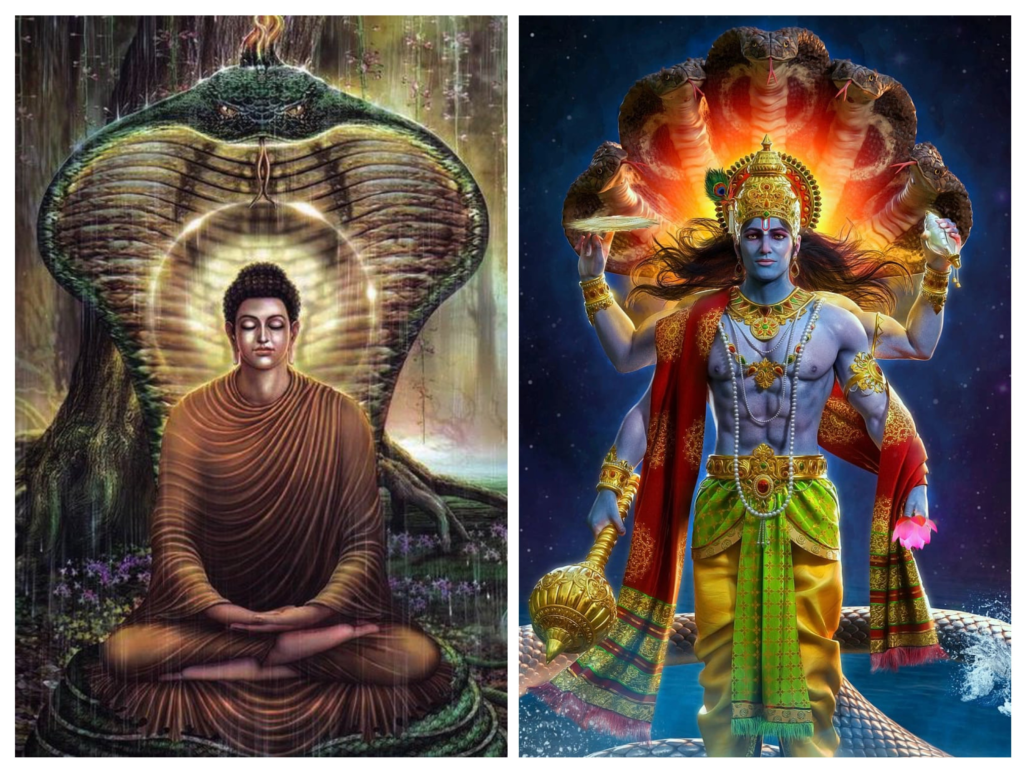- Origin: Buddhism originated in India around the 6th century BCE, while Hinduism is a much older religion with roots in the Indus Valley Civilization (3300-1900 BCE).
- Beliefs: Buddhism is a non-theistic religion, meaning it does not believe in a god or gods. Hinduism, on the other hand, is a polytheistic religion with a vast pantheon of gods and goddesses.
- Goals: The goal of Buddhism is to achieve enlightenment, which is a state of perfect wisdom and compassion. The goal of Hinduism is to achieve moksha, which is liberation from the cycle of birth, death, and rebirth.
- Reincarnation: Buddhists believe in reincarnation, the idea that the soul is reborn into a new body after death. Hindus also believe in reincarnation, but they believe that the soul can also be reborn into a lower or higher form of life, depending on its karma.
- Ethics: Both Buddhism and Hinduism emphasize the importance of ethics and morality. However, Buddhist ethics are based on the concept of karma, the idea that our actions in this life will affect our future lives. Hindu ethics are based on the concept of dharma, the universal law of righteousness.
- Practices: Buddhist practices include meditation, mindfulness, and yoga. Hindu practices include puja (ritual worship), meditation, and yoga.
The Roots:
Buddhism evolved out of the Sramana tradition.
Hinduism evolved out of the Vedic Brahminism.
Founder:
Buddhism’s founder is Siddhartha Gautam (Buddha).
Hinduism has no one founder but is instead a fusion of various beliefs.
Cause of Origin:
Buddhism arose out of Sramanism because of the unique teachings of Buddha and the distinctive monastic rules set by Buddha. (600 BCE – 500 BCE)
Hinduism emerged as a result of incorporating/absorbing non-Vedic ideas and traditions into Vedic Brahminism which happened after Vedic times, between 500 BCE and 300 CE.
Beliefs:
Buddhist beliefs include:
- 3 marks of existence- impermanence, non-self, suffering/dissatisfaction
- the 4 noble truths
- the noble 8-fold path
- Nirvana(liberation)
Hindu beliefs include:
- everlasting soul
- Brahman(the supreme self)
- the 4 objectives of life- Dharma(righteousness), artha(means), kama(desire), Moksha(salvation)
- as well as belief in creator God(s)
God(s):
In Buddhism, there is no creator God but there are gods in higher realms who are mortal and people can reborn as gods by accumulating merits.
In Hinduism, there is a creator God in general, and also gods in heaven who are immortal although there’s no way people can reborn as gods except being able to unite with the supreme soul of God.
Practices:
Buddhist practices include:
- listening to Dharma teachings
- taking refuge in 3 jewels- Buddha, Dharma, Sangha
- giving or charity
- offering flowers and foods to Buddha (in form of worship)
- keeping moral precepts
- chanting mantras (in Mahayana)
- worshipping deities (in Mahayana)
- various forms of meditation
Hindu practices include:
- worshipping deities of preference
- reciting from sacred scripts
- chanting mantras
- performing yajna(sacrificial ritual)
- singing devotional hymns
- yoga and meditation
Nirvana Vs Moksha
Nirvana, the final goal in Buddhism, is the attainment of Sunyata(state of null) through acceptance of anatman(non-self), the realization that there is no permanent self nor permanent consciousness.
Moksha, the final goal in Hinduism, is the unification with Brahman(eternal entity) through acceptance of atman(soul), the consciousness of oneness with Brahman and understanding Brahman as the Self.


